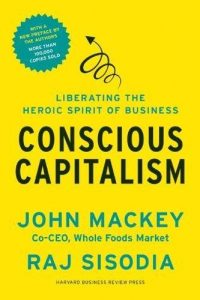“We need to discover anew what makes free-enterprise capitalism what it has been: the most powerful creative system of social cooperation and human progress ever conceived. We next need to rethink why and how we engage in business to better reflect where we are in the human journey and the state of the world we live in today.” —John Mackey
Thanks to the sponsorship of the Adam Smith Society, I recently had the pleasure of enjoying a private dinner with Whole Foods CEO John Mackey. Molded on the lines of the Federalist Society for legal professionals, the Adam Smith Society is an ideas-centered organization that seeks to connect business students, executives, and entrepreneurs who share a commitment to free markets, individual liberty, limited government, and classical liberal philosophy. The Austin Chapter was especially fortunate to host hometown hero John Mackey given his open advocacy of libertarianism and capitalism and the recent Whole Foods-Amazon merger.
Of course, Mackey was asked for his opinion regarding that particular “elephant in the room” during dinner but gave guarded answers, as expected. But the evening’s most rewarding aspect was the direct exchange of ideas on entrepreneurship, business ethics, and political philosophy, specifically the new movement he inspired: Conscious Capitalism.
 Mackey and his coauthor, Harvard business school professor Raj Sisodia, elaborate on the concepts behind Conscious Capitalism in their book of the same name. At the fundamental level, Mackey takes pains to remind us that free-market capitalism is inherently good, and it is “the greatest system for innovation and social cooperation that has ever existed.” Billions of people have been lifted out of poverty, average life expectancy has increased, major diseases have been contained or outright eliminated, and civil liberties and freedom across the board have increased in the span of only 200 years when the Hobbesian state of nature was the norm for almost all people for most of human history. These indisputable trends are well-documented by eminent scholars such as Deirdre McCloskey and Steven Pinker, and by multidisciplinary projects such as HumanProgress.org and Our World in Data.
Mackey and his coauthor, Harvard business school professor Raj Sisodia, elaborate on the concepts behind Conscious Capitalism in their book of the same name. At the fundamental level, Mackey takes pains to remind us that free-market capitalism is inherently good, and it is “the greatest system for innovation and social cooperation that has ever existed.” Billions of people have been lifted out of poverty, average life expectancy has increased, major diseases have been contained or outright eliminated, and civil liberties and freedom across the board have increased in the span of only 200 years when the Hobbesian state of nature was the norm for almost all people for most of human history. These indisputable trends are well-documented by eminent scholars such as Deirdre McCloskey and Steven Pinker, and by multidisciplinary projects such as HumanProgress.org and Our World in Data.
Despite all these major gains, capitalism remains under attack by intellectuals and political activists. In addition to the growth of “crony capitalism,” Mackey believes a major philosophical and rhetorical reason is responsible for capitalism’s bad PR:
In recent years, the myth that business is and must be about maximization of profits has taken root in academia as well as among business leaders. This has robbed most businesses of the ability to engage and connect with people at their deepest levels.
This stance can be traced to a famous article by the late Nobel-winning economist Milton Friedman, “The Social Responsibility of Business is to Increase its Profits.” Despite considering Friedman as one of his personal intellectual heroes, Mackey believes Friedman’s view is too narrow and challenged him on this topic in a debate back in 2005. This exchange is archived by Reason Magazine and is well-worth reading as it exhibits the highest standards of professionalism and respect between two accomplished gentlemen with diametrically opposed views (especially relevant for today given the significant drop in civility between political opponents).
Fast forward to 2017. Some of the most admired (and top-earning) companies today include Amazon, Costco, Google, Patagonia, Southwest Airlines, Starbucks, and of course, Whole Foods. Each of these companies is cited by Mackey as those that have embraced its “rising consciousness.” He is convinced that a “conscious business energizes and empowers people and engages their best contribution in service of its noble higher purpose. By doing so, a business has a profoundly net positive net impact on the world.”
The Four Tenets of Conscious Capitalism
To “liberate the heroic spirit of business and our collective entrepreneurial creativity so they can be free to solve the many daunting challenges we face,” Mackey outlines his vision for Conscious Capitalism which includes the following foundational tenets: higher purpose, stakeholder integration, conscious leadership, and conscious culture and management.
There is nothing wrong, per se, with wanting to make a lot of money, but it’s not particularly inspiring. Instead, a conscious business should have:
…. a higher purpose which addresses questions such as: Why do we exist? Why do we need to exist? What is the contribution that we want to make? Why is the world a better place because we are here? Would we be missed if we disappeared?
Mackey suggests that businesses look to transcendental Platonic ideals for inspiration: The Good (service to others—improving health, education, communication, and quality of life), The True (discovery and furthering human knowledge), The Beautiful (excellence and creation of beauty), and The Heroic (courage to do what is right and improve the world). A clearly defined higher purpose will serve as the foundation stone of the business and can inspire and galvanize all stakeholders.
For a conscious business, stakeholders go beyond that of only shareholders interested in short-term profits. Under a conscious business model, major stakeholders will include “customers, team members, suppliers, investors, the community, and the environment.” Each part is linked together and the success of one constituency is directly dependent upon the others. Conscious Capitalism, at its essence, “recognizes that business is the ultimate positive-sum game, in which it is possible to create a Win for all the stakeholders of the business.”
For example, a conscious firm’s higher purpose and values will attract the right team members. These inspired team members will have higher levels of creativity and be more likely to deliver superior customer service which would translate into improved market share, higher revenues, profits, and shareholder value. (For skeptics concerned with measurable objectives and the bottom line, Raj Sisodia has marshaled an impressive array of evidence showing that conscious businesses are growing faster and are bringing in superior financial returns compared to their traditional competitors.)
To achieve these goals, establishing conscious leadership is an imperative for the company. Conscious leaders are “emotionally and spiritually mature…. and primarily motivated by service to the purpose of the business and its stakeholders, and not the pursuit of power or personal enrichment. They develop and inspire, mentor and motivate, and lead by example.” These leaders must possess “exceptional moral courage” and “above all, view themselves as trustees of the business, seeking to nurture and safeguard it for future generations, not to exploit it for the short-term gains of themselves or current stakeholders.”
With conscious leadership, people within the organization derive meaning from their work, and grow and evolve as both individuals and leaders on their own. A successful leader will recognize and nurture a healthy company culture that keeps the company committed to its higher purpose and maintain the harmony of interests between different stakeholders. As an energizing and unifying force, a conscious culture will bring a conscious business to life.
Summing up his new vision for business and philosophy, Mackey reminds us that:
Business is fundamentally about people working together cooperatively to create value for other people. It is the greatest creator of value in the world. This is what makes business ethical and makes it beautiful. It is fundamentally good. It becomes even better when it is fully conscious of its inherent purposes and extraordinary potential for value creation….
Our dream for the Conscious Capitalism movement is simple: One day, virtually every business will operate with a sense of higher purpose, integrate the interests of all stakeholders, develop and elevate conscious leaders, and build a culture of trust, accountability, and caring.
Millennial Entrepreneurship and the Road Ahead
During dinner, Mackey mentioned that he wrote his book with Millennial entrepreneurs in mind. This revelation meant a lot to me knowing that he, for all of his successes, is placing his hopes on my generation. Various polls have shown conflicting Millennial attitudes towards capitalism and socialism. But to me, the evidence is all around: we ride Uber and Lyft, we subscribe to Netflix, we expect free two-day deliveries with Amazon Prime, we take pride in being foodies, and we spend copious amounts of time on Facebook, Twitter, and YouTube. All of these everyday delights we take for granted are the fruits of the labor of free minds, free peoples, and free markets. As Brittany Hunter of FEE aptly summarizes, “Millennials Are The Most Capitalist Generation, They Just Don’t Know It.” Despite being cash-strapped, encouraging data show a large number of Millennials who still possess an entrepreneurial streak.
I encourage my fellow Millennials and entrepreneurs to read Mackey’s book, think about his message, and show this world what we can do!
This article was originally published on FEE.org under the title “In Capitalism, Nice Guys Finish First.” Read the original article. _________________________________________________________
 is a graduate of the MSTC Class of 2017. He currently works in the biotech/healthcare industry.
is a graduate of the MSTC Class of 2017. He currently works in the biotech/healthcare industry.